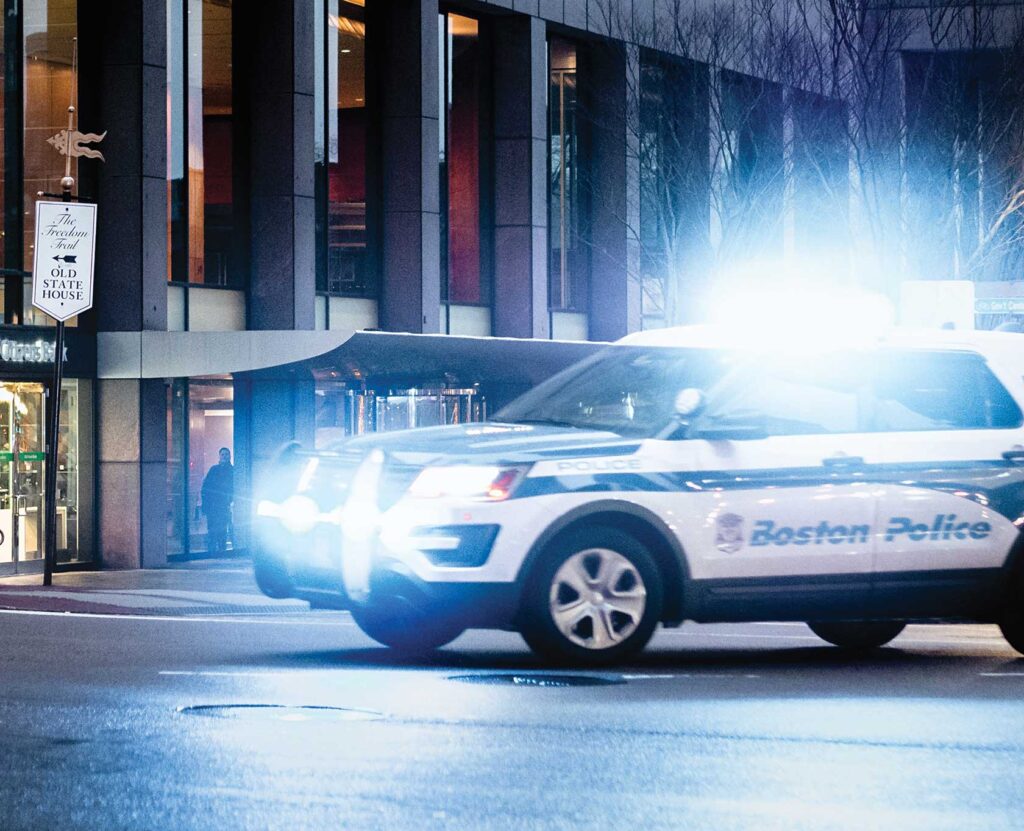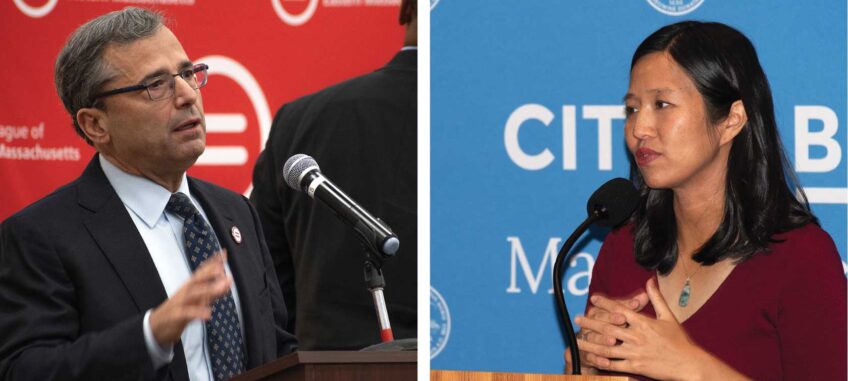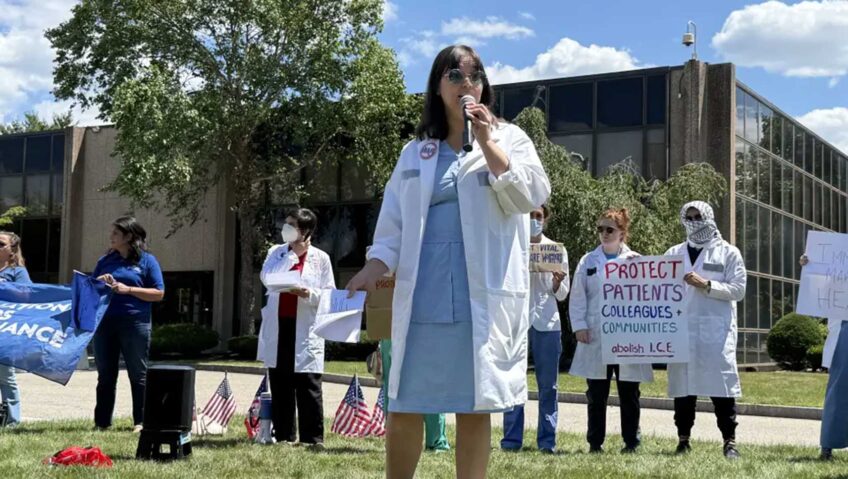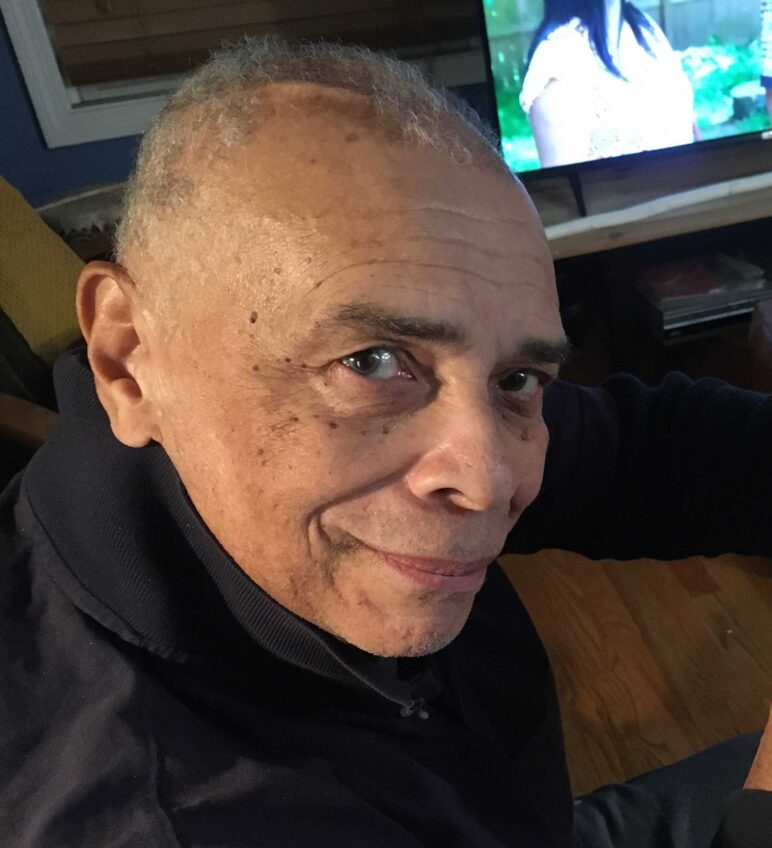Boston City Council holds hearing on information sharing between Boston Police and ICE

When Boston City Councilor Ben Webber asked police during a hearing last week about the frequency and nature of their information sharing of Boston Police databases with ICE officers and other federal officials, he was assured cooperation with the federal agency was limited to criminal investigations on crimes such as human trafficking and firearms trafficking.
“We do not share information with the enforcement and removal side of ICE, and they don’t receive any of our regular intelligence production,” said Ryan Walsh, director of the Boston Regional Intelligence Center (BRIC).
But Fatema Ahmad, executive director of the Muslim Justice League, testified that her office examined 400 pages of intelligence reports on protests against Israel’s war in Gaza compiled by BRIC and distributed to federal agents covering the months between October and December of 2023, which included twice-daily reports on protests organized by Jewish, Muslim and student-led organizations.
The frequency of communication between Boston police and federal agents is concerning, Ahmed said, at a time when federal authorities are laser focused on meeting deportation quotas imposed by the Trump administration.
“It is very clear that the agenda right now is that the entirety of the Department of Homeland Security is going to focus on detaining and deporting immigrants,” she said. “Other grants are getting cut. Those remaining are going to be shifted to focus on that. It is really, really dangerous to think that that’s not going to happen with this grant that we already know is tied to information sharing with federal law enforcement.”
The subject of last week’s hearing — the BRIC — is one of many so-called fusion centers created around the country after the Sept. 11, 2001 attack that brought down the World Trade Center in New York and damaged the Pentagon. The BRIC includes Boston, Brookline, Cambridge, Chelsea, Everett, Quincy, Revere, Somerville and Winthrop. The information sharing enables police in each jurisdiction to access information from surveillance cameras, license plate readers and surveillance reports across city lines. Funded largely by grants from the federal government, the BRIC also allows federal authorities including the FBI, Department of Homeland Security and ICE access to the surveillance reports generated by law enforcement operating in the nine municipalities that make up the BRIC.
At-large Boston City Councilor Henry Santana, chair of the Public Safety and Criminal Justice Committee, called the hearing to review the BRIC’s activities in advance of expected federal grants that funds the agency.
During the hearing, Walsh’s assertion of limited interactions with ICE was undercut by testimony from Ahmed and others on a panel of civil rights activists who testified in a Boston City Council hearing that they had found evidence of extensive communication between police and federal immigration officials.
Last week, ICE agents arrested Tuft University graduate student Ruymesa Ozturk who last year co-authored an op-ed in a student newspaper calling on the university to take a public stand against Israel’s killing of Palestinians in Gaza, disclose its investments in companies doing business with Israel and withdraw them. Ozturk, who was in the United States legally, had no criminal or immigration related violations prior to her arrest.
Ozturk’s arrest came on the heels of an ICE action during which 370 immigrants in Massachusetts were arrested and deported.
The increased ICE activity has sparked outrage from public officials, including Mayor Michelle Wu who on April 2 attended a protest against Ozturk’s arrest and pending deportation in front of the John F. Kennedy Federal Building.
“Boston will never back down to bullies,” Wu told an audience made up largely of union activists. “And in this moment, in an onslaught of injustice, what we are going to do is stand up together.”
Wu as a councilor in 2021 voted against funding the BRIC and as a mayoral candidate vowed to abolish the Boston Police Department’s controversial gang database, which contains the names of teenagers and young men police assert are enrolled in or affiliated with gangs.
As mayor, Wu has backed away from abolishing the database. She has also defended continued funding for BRIC, even as activists caution the information sharing the agency engages in with federal authorities endangers immigrants and Boston citizens.
Other elected officials who have spoken out against Ozturk’s arrest, such as Somerville Mayor Katja Ballantyne, have similarly supported their cities’ participation in the BRIC’s information sharing with federal agencies.
Activists who testified before the city council last week said the network of license plate readers, cameras and other surveillance technologies enable local and federal law enforcement agencies enrolled in the BRIC unprecedented access to Boston area residents’ personal information.
“Put together and taken more broadly, these are tools for mass data collection on Boston on a scale broader than the gang database alone,” said Alli Finn, director of campaigns for the anti-surveillance group Kairos Action. “This allows agencies with access to this information to, quote, ‘predict’ behavior and target people for their beliefs, identity, movements and relationships or simple economic circumstances that have made them targets of the criminal legal system.”
While the BRIC was originally set up as an anti-terrorism network, Kade Crockford, director of the Technology for Liberty Program at the ACLU of Massachusetts, said fusion centers such as the BRIC have not been effective at identifying or neutralizing actual threats, citing a 2012 congressional report authored by the late Sen. Tom Coburn, a Republican who represented Oklahoma.
“The report found that fusion centers produce intelligence of, quote, ‘uneven quality, oftentimes shoddy, rarely timely, sometimes endangering citizens’ civil liberties and Privacy Act protections,’” Crockford said.
“In the fall of 2011, the same time period during which the Russian government notified the FBI that Temerlan Tsarnaev was a terrorist, the BRIC was involved in extensive surveillance of Occupy Boston protestors,” Crockford added.
Tsarnaev went on to perpetrate the 2013 Boston Marathon bombing in which three people were killed and 264 were injured.
While the BRIC has conducted extensive monitoring of social movements such as the Black Lives Matter protests, when the white nationalist Patriot Front marched in downtown Boston in July of 2022 armed with sticks and metal shields and assaulted a Black man they passed on the sidewalk, Boston Police were not present and said they had no foreknowledge of the demonstration.
Crockford said Boston’s continued involvement with BRIC will likely draw department resources away from the work of preventing violent crime.
“Donald Trump campaigned on a platform of immigrant enforcement and to effectuate that goal, his administration has directed federal agencies to shift efforts away from sex and drug trafficking, fraud and other serious criminal matters and to focus instead on rounding up immigrants,” Crockford said.
Heather Perez Arroyo, a senior immigration attorney with the Mass Law Reform Institute, said the recent arrests of immigrants who are in the country legally on charges of gang membership point to a disturbing trend.
“The harm immigrants suffer now from completely unfounded allegations of gang membership is severe,” she said. “It’s deprivation of liberty and due process.”
The federal grants funding BRIC — including the Urban Area Security Initiative Grant and the Emergency Management Performance Grant — last year brought $2 million to the agency, Ryan said. Councilors have not yet indicated whether they will approve the grants for this year.
This article first appeared on The Flipside.







